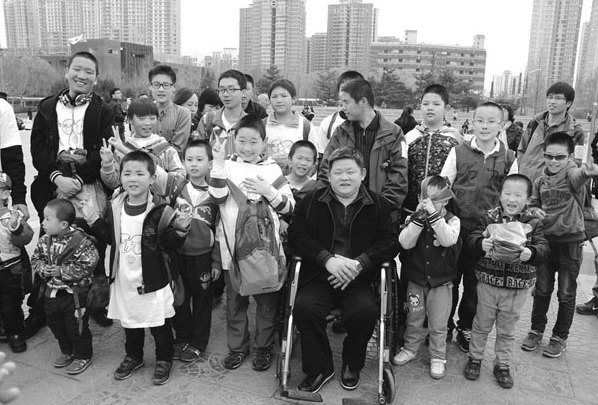Blood brother
Updated: 2013-08-15 08:01
By Liu Zhihua (China Daily)
|
||||||||
|
Guan Tao (in wheelchair) meets children with hemophilia at an activity arranged by Guan's Hemophilia Home. Provided to China Daily |
Hemophiliacs have a champion in Guan Tao, who rose above his condition and helps fellow sufferers lead normal lives and get medical help, Liu Zhihua reports.
As a 9-year-old schoolboy, Guan Tao knocked his right leg accidentally against a desk. It bled for a month, and afterward became deformed.
He had to quit school three months after enrolment.
At the age of 12, his left leg also became dysfunctional from internal bleeding, and his world shrank even smaller.
Today, things are different.
Sitting in a wheelchair, the 42-year-old Beijing resident moves around a crowded two-bedroom apartment that he and his colleagues use as an office.
Guan is the founder of the Hemophilia Home of China, a non-governmental organization that supports people suffering from inheritable bleeding disorders.
He has been using crutches and a wheelchair since he was 12, when hemophilia caused internal bleeding in the joints and muscles, which deformed his leg joints and deprived him of the ability to walk.
However, together with other hemophiliacs across China, he has succeeded in having hemophilia partly covered by China's medical insurance, which means timely treatment is now affordable for many hemophiliacs in China.
"Hemophiliacs' treatment is not complicated, but it is very costly, up to hundreds of thousands of yuan for a patient a year," Guan says.
"If the government does not pay for it, many hemophiliacs cannot afford the life-saving treatment.
"I've been suffering from disability because there was no efficient treatment when I was young, and I hope such tragedy will not happen to others now."
When Guan was an infant, his parents were confused because he would cry all day and there were always bruises on his body. They did not know what was wrong until he was diagnosed with the disease.
Such a diagnosis almost meant a death sentence at that time - the disease was unfamiliar even to doctors, and there was no treatment available, apart from blood transfusions to replace severe blood loss.
Throughout his childhood, bruises would suddenly appear on his body. Any slight collision would hurt him, and a small cut would lead to continuous bleeding.
Every three to four days, there would be internal bleeding, a common symptom of the disorder.
The escaping blood would pressure and damage joints, muscles and organs, and cause unbearable pain, Guan says.
Doctors even told his parents to be prepared for his disability and death, Guan recalls.
Sometimes, when the pain was too intense, Guan would hide in bed and turned on a torch as a distraction.
He felt very lonely, although people were nice. Neighbors would help look after him; children in the community would come to play with him, and public library staff members would bring books to him every month until he turned 18.
In 1999, in a voluntary genetic-scanning program, Guan met and made friends with several people like himself for the first time.
He was so excited that he called them frequently to chat.
Through the conversations, Guan found that they all shared an impression that the society knew little about hemophilia, and even though people wanted to help, they didn't know how to.
Guan was eager to change that. "Hemophiliacs are very miserable," Guan says.
"Ordinary people have no idea how hard life is for us. We are in constant fear for internal bleeding, pain and complications."
Guan decided to organize a support group, and to spread knowledge of hemophilia through the newly emerged Internet.
He spent two days calling hotlines of media, explaining the plight hemophiliacs faced, and begging for news coverage.
Finally, a newspaper in Beijing highlighted the group, and with a large sum of money donated by one enterprise, Guan established a website committed to hemophiliacs.
The website was the first in China to inform ordinary people about hemophilia, and it soon served as a bridge for hemophiliacs nationwide.
People visited the website, wrote their stories in the online forums, shared treatment information, and supported each other.
Many of them called Guan to offer, or to seek, help.
Then Guan realized the biggest problem for hemophiliacs is the costly treatment, which prevented many with the condition from living a better life.
Clotting factors replacement therapy, a treatment that uses clotting factors made in labs to help blood to clot normally and prevent damage to muscle, joints, and organs, was proved safe and efficient, but expensive.
"Most hemophiliacs do not have a job or money, and cannot afford it."
Worse is that China's medical insurance did not cover any hemophilia medicine.
In 2003, Guan studied China's complicated health insurance policy, and organized volunteers to lobby local governments on the issue.
"We petitioned with perseverance, patience and communication skills, not with anger and hostility," Guan says.
Guan also made good use of media exposure to educate the society more about hemophilia, the patients' lives, and their vulnerability.
In 2004, Guangdong's capital Guangzhou became the first city in China to partially cover hemophilia treatment.
In 2006, the city of Tianjin made a similar decision. Today, nearly all of China's first-tier cities have provided such insurance coverage.

Last year, Guan officially registered the group as a nongovernmental organization for the estimated 10,000 hemophiliacs in China, and named it the Hemophilia Home of China.
The organization now has more than 20 branches across China, and works on quite a few projects.
Apart from offering free medicine, financial aid and psychological consulting to patients, his team is urging health authorities to make a health emergency card for hemophilia patients.
"Time is life for hemophilia patients in medical emergence, especially when there is bleeding," Guan says.
With personal information, health condition, and rescue directions, the card will save doctors time deciding how to treat a hemophilia patient in a medical emergency, even when the doctors know little about hemophilia, Guan believes.
Contact the writer at liuzhihua@chinadaily.com.cn.
(China Daily USA 08/15/2013 page10)

 Spielberg has desire to work with Zhang Yimou
Spielberg has desire to work with Zhang Yimou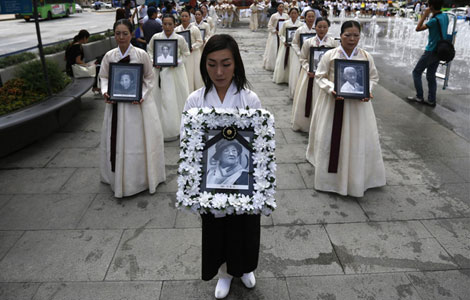
 Requiem ceremony for former comfort woman
Requiem ceremony for former comfort woman
 Egypt forces crush protesters
Egypt forces crush protesters
 Two killed in fiery crash of UPS cargo jet
Two killed in fiery crash of UPS cargo jet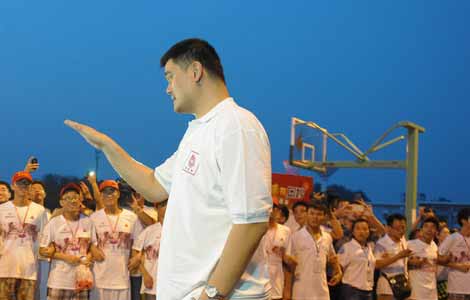
 Yao dreams of sports for fun with towering charity
Yao dreams of sports for fun with towering charity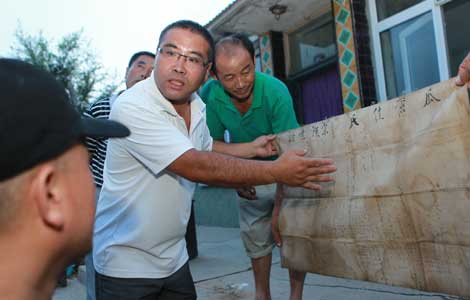
 Re-enacting ancestors' journey to the west
Re-enacting ancestors' journey to the west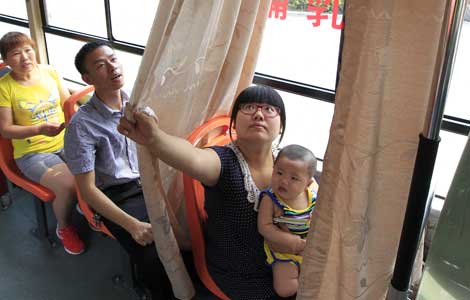
 Special bus seat for breast-feeding mothers
Special bus seat for breast-feeding mothers
 Northern exposure
Northern exposure
Most Viewed
Editor's Picks

|

|

|

|

|

|
Today's Top News
US asks China's help on DPRK issues
Movie tax flack is settled
Manning 'sorry' for US secrets breach
China to be world's No 1 consumer
Gold rises on physical buying from Asia
Millionaires hold dimmer view: Survey
China to probe foreign automakers
Snowden case not to affect US-Russia talks
US Weekly

|

|
